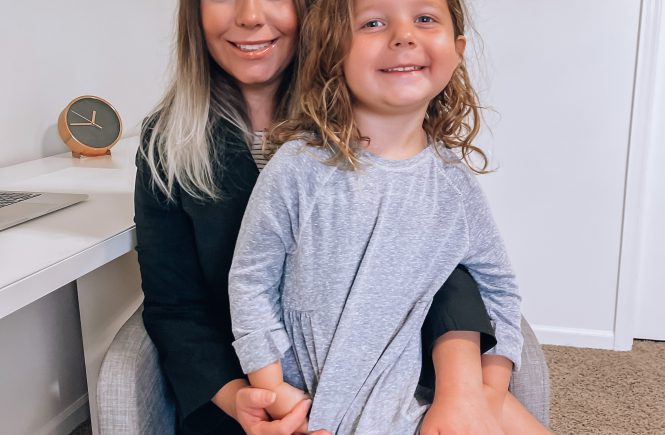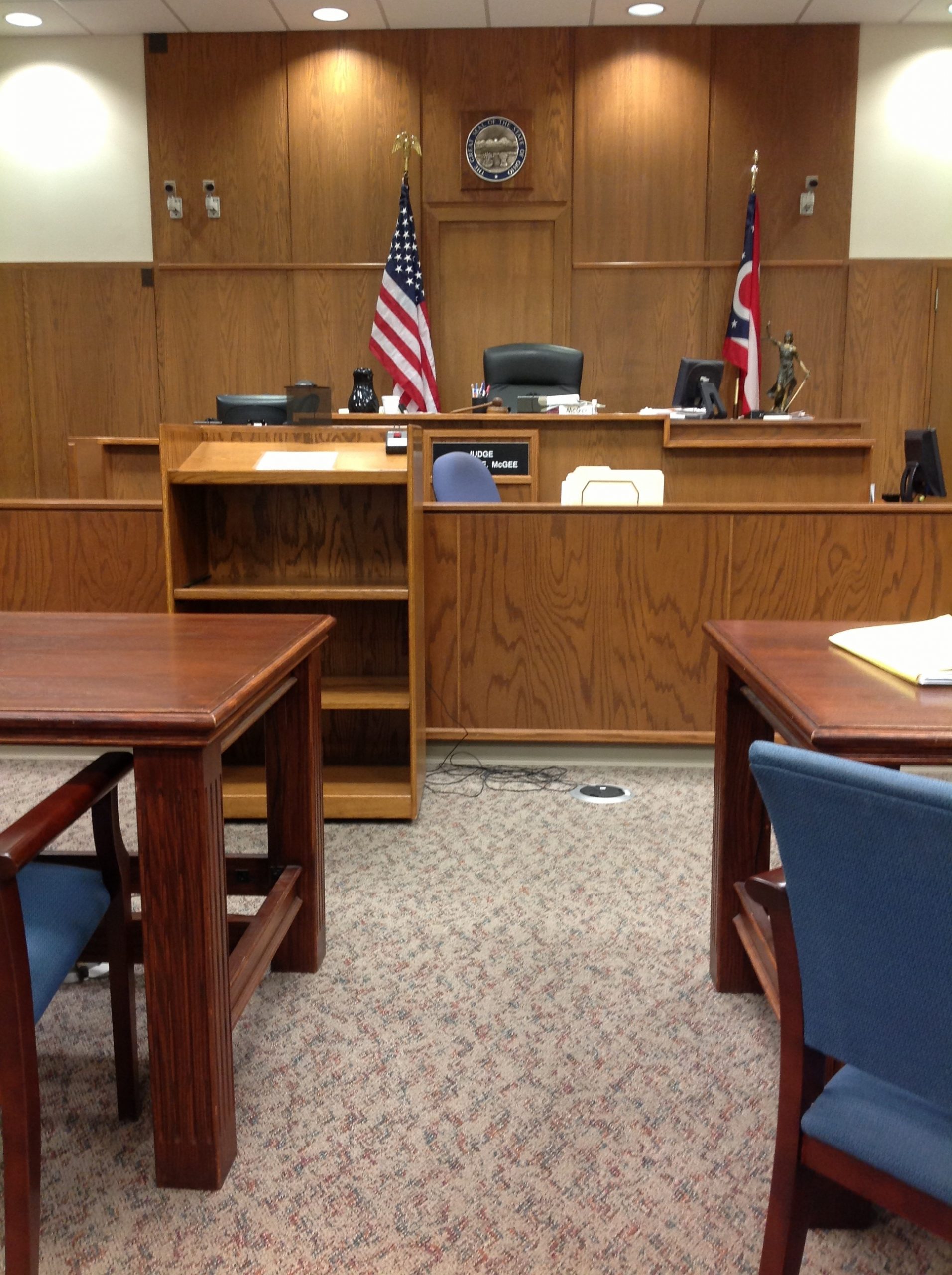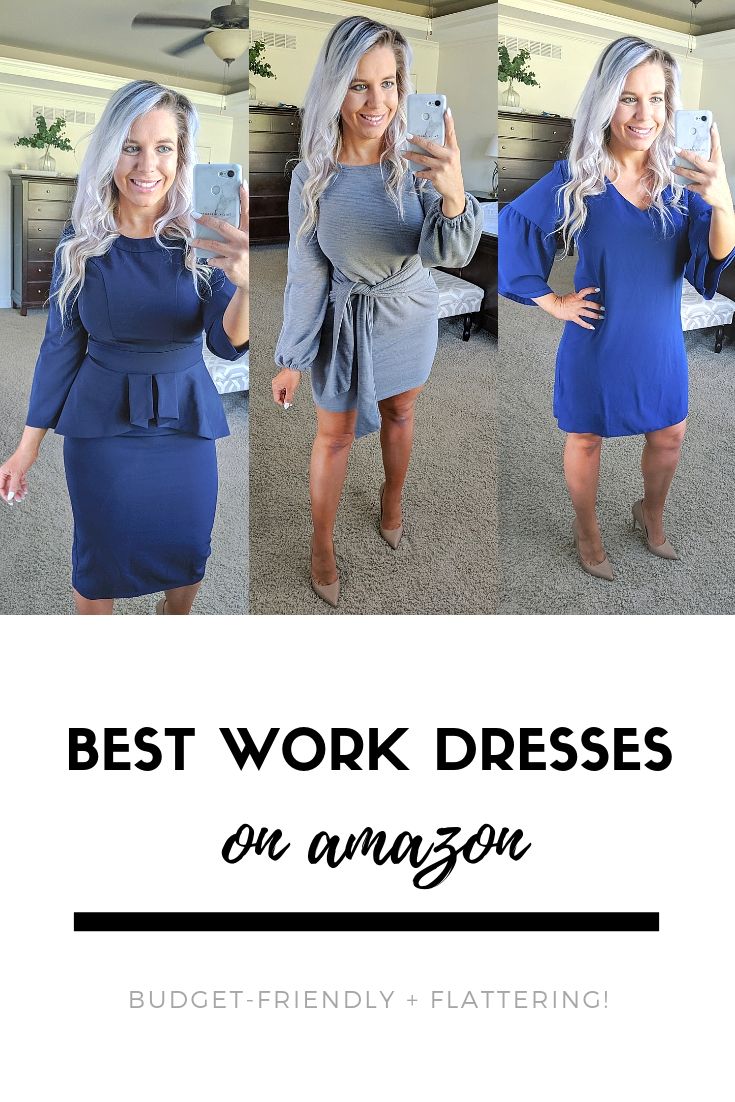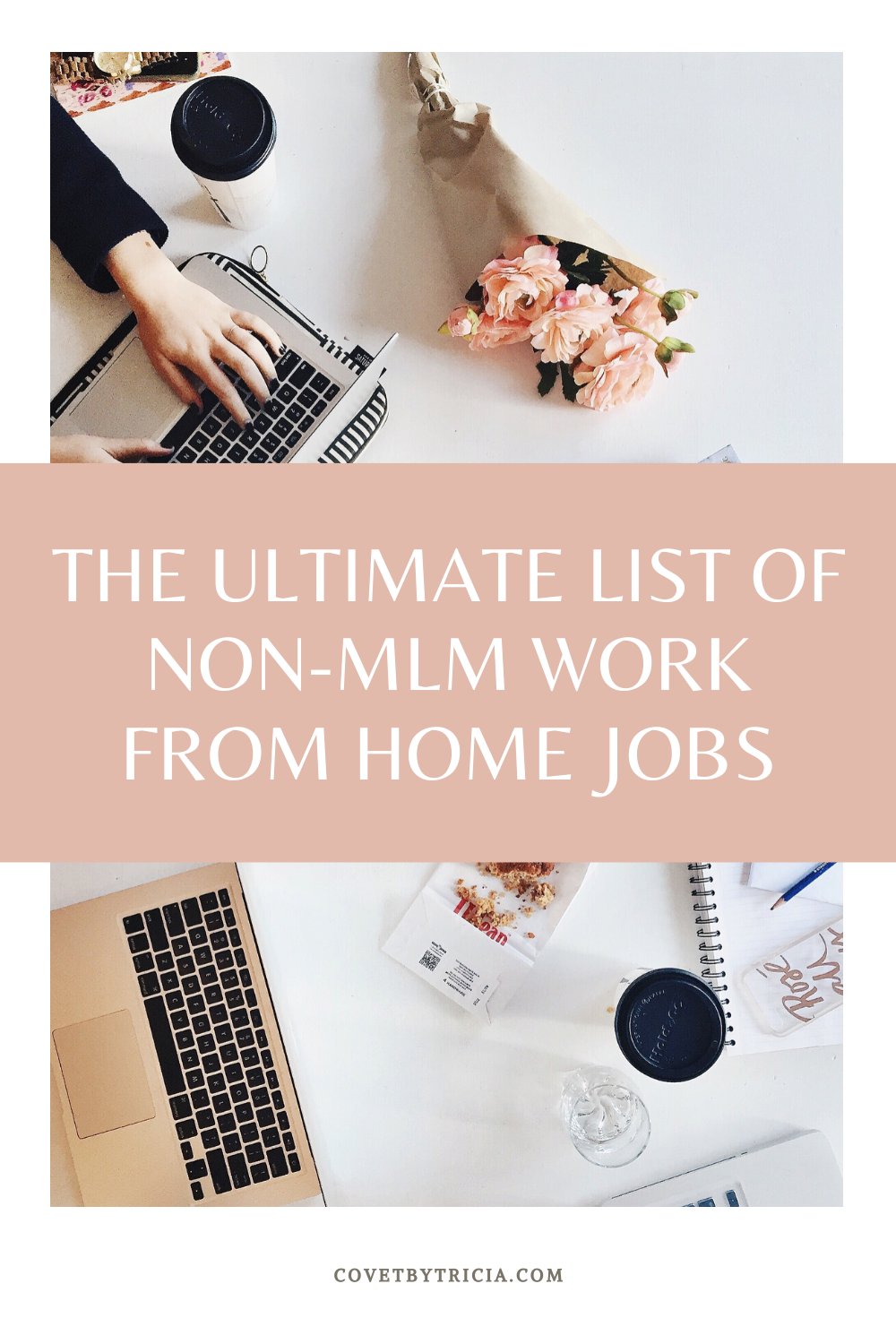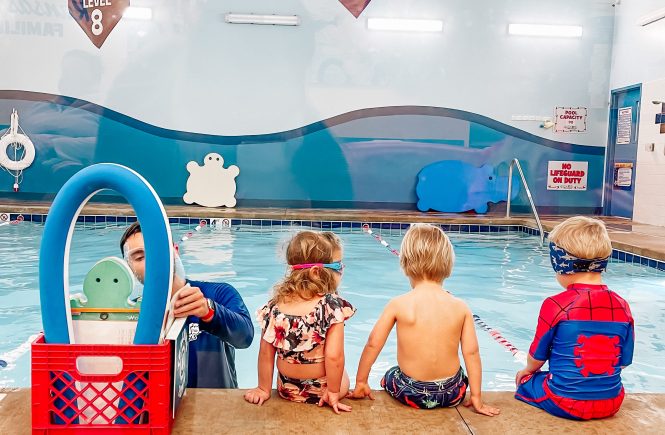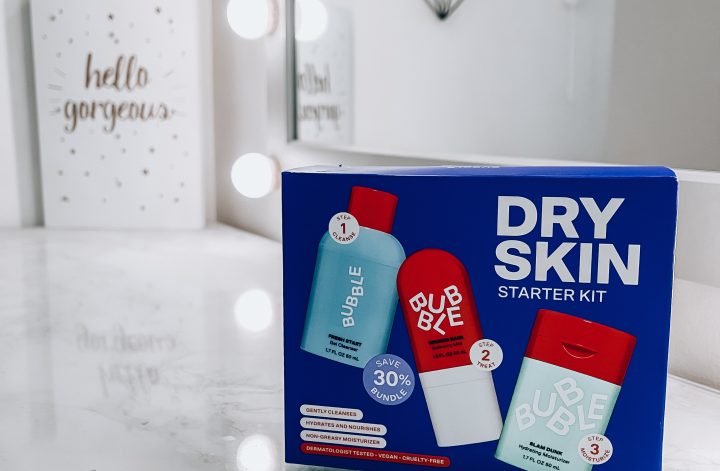I have some big news to share: I passed the Kansas bar exam! A lot of you noticed I haven’t been posting as regularly, and I appreciate everyone who reached out to me on Instagram to check in. I didn’t post about the bar because, quite frankly, I was scared I was going to fail. But, thankfully, I passed (by a nice margin, actually) and now I want to share with you how to self-study for the bar exam. So, keep reading to find out how I passed the bar without a prep course…
This post contains commissionable links. Please see the Legal page for more information.
My Legal Background
Before I get into how to self-study for the bar exam, I’m going to explain a little bit about myself and my legal experience so you can gauge where I was going into this. I graduated from University of Kansas School of Law in 2010 and passed the Missouri bar that July. Then, I transferred my MBE score to Illinois and sat for the essay portion of the Illinois bar in February 2011, which I also passed. This was before the days of the UBE (Uniform Bar Exam), so you still had to write essays for each jurisdiction even if you transferred an MBE score.
During this time, I was an associate at a firm in Kansas City, MO doing civil defense litigation. I planned to take the Kansas bar after Illinois. But when the time came, I was burnt out on studying and bar exams. Plus, my firm did extremely minimal work in Kansas, so it wasn’t necessary for my professional advancement. So, I put the Kansas bar on the back burner and focused on the almighty billable hour.
I left the practice of law in 2014 because we wanted to start a family. My work involved too much travel and too many long hours to be conducive to family life, especially considering my husband also works a demanding job. Colton was born, then Blair came along, and I had a successful blogging and social media business.
Even so, I always talked about taking the Kansas bar as a “bucket list” item. (And yes, I’m aware that is probably the most dull bucket list item in all of history.) The events of the past couple years really put things into perspective for me, particularly the fact that time is fleeting and we never really know how much longer we have here on earth. So, I figured I might as well get cracking on that bucket list.
As luck would have it, I happened to check out the rules for the Kansas bar a few days before applications were due for the July 2021 exam. I took it as a sign and got to work on my application right away.
At this point, I was 33 years old, 11 years out of law school and 7 years out of legal practice. Given that my practice area in products and premises liability was relatively niche, I hadn’t thought about the majority of bar exam subjects for 11 years. Although I had passed 2 bar exams and had work experience as an attorney, it was definitely going to be an uphill battle to pass the UBE.
Deciding to Self-Study for the Bar Exam
Now that I was signed up for the bar exam, the next step was figuring out how I was going to study. I used the full BarBri course when I took the Missouri bar in 2010. At that time, I hadn’t really considered how to self-study for the bar exam. The vast majority of my law school classmates were taking BarBri, so I did too. Once I had one bar under my belt, I used a couple Illinois-specific books from a co-worker to study for the Illinois bar. It was much lower pressure because, even if I failed, I was still an attorney. Plus, I had a fair amount of knowledge in my head from taking another bar exam 6 months prior.
However, when I was looking to take the Kansas bar, the last time I had sat for a bar exam was 10+ years ago. I went back and forth about doing BarBri again, but the cost was a minimum of $1,999. It would jump to $2,599 if I wanted the hard copy books–which I felt like I needed because I am old school and like to highlight and mark physical pages.
I had already paid around $1000 to register for the bar, plus I needed to purchase a laptop for the exam, as I only had a desktop computer. (I know I said I’m old school, but I’m not old school enough to handwrite the bar exam!) So, I was already looking at dropping a few grand on this venture, and I was only doing this for bucket list purposes–I didn’t have a job lined up or even know if I was returning to legal work.
Obviously, I needed to figure out a way to keep costs down. I couldn’t eliminate the registration fees, and, while I could’ve chosen a cheaper laptop, it was time to upgrade my computer for my business anyway. Eventually, it came down to eliminating a bar exam prep course. I had to figure out how to self-study for the bar exam.
It was a risky decision, one that you’re probably contemplating as well if you’re reading this post (especially if you’ve made it this far!). As I mentioned, I didn’t have a job riding on this–but, due to the lack of legal employment, I’m also not flush enough with cash that I could keep dropping $1,000 registration fees if I failed. (Also, Kansas only allows applicants to take the UBE 4 times, so that puts a little more pressure on passing in a timely manner.)

Should I Self-Study for the Bar Exam?
Here are some of the factors I considered when deciding whether to self-study for the bar exam:
- Cost: Obviously, this is a huge factor. I saved around $2,000 by doing self-study.
- Motivation: I run my own business, so I’m no stranger to motivating myself. Being able to motivate yourself is a huge component of self-study, since you don’t have a prep course to tell you how far along you should be.
- Test-Taking Ability: Although it had been 10+ years since I was in law school, I always did well on exams and had already passed 2 bar exams. I was confident that I could test well, so long as I put in the time to learn the material.

How to Self-Study for the Bar Exam
Now I’m going to share with you how to self-study for the bar exam! This is exactly what I did to pass the bar exam without a prep course.
It was the beginning of April when my bar exam application was submitted, which left me with about 4 months to study until the exam at the end of July. Most commercial bar prep courses have you begin studying about 2 months before the exam, but I knew I would need to divide my time differently because I wouldn’t be able to study the 8+ hours per day the prep courses require. Plus, my kids would be out of school around the end of May, which meant I would have substantially less free time in June and July than I would in April and May.
Therefore, I decided to start casually studying right away. The first thing you’ll want to do is head to the official NCBE website and read up on the UBE (or, your own jurisdiction’s website if you’re not in a UBE state). They have specific pages for the Multistate Essay Examination (MEE), Multistate Performance Test (MPT), and Multistate Bar Examination (MBE). Each of those pages includes a downloadable subject matter outline, as well as example questions. Although the subject matter outlines don’t include substantive law, reading over them will give you an idea of what topics are familiar to you and which ones you’ll need to spend more time learning. It’s a good way to begin wrapping your head around the universe of material you’ll need to learn for this exam. (Don’t spend too much time on this step; I only spent one evening reviewing these outlines.)
My first step in substantive study was to begin listening to the free Studicata videos on YouTube whenever I was driving. Throw these on while you’re commuting, taking the kids to school, running errands, etc. It was a nice way to passively learn some of the key concepts without adding extra time to my day. Sometimes my kids would listen along with me, and sometimes I’d give them their tablets and headphones to listen to their own shows/music. (To clarify, I was only listening to the lectures and not actually watching the video itself while driving. Safety first!)
Another popular option is the Bar Exam Toolbox podcast. If you’re in a low coverage area where streaming while driving isn’t an option (or you have a limited data plan), download some episodes of the podcast to listen on the go. Personally, I didn’t find it nearly as helpful as Studicata, but it’s worth a listen to see what works better for you.
I also ordered a used set of BarBri books off eBay and began reading through them. Approximate cost was around $220, which was a huge savings from the nearly $2,600 that I would’ve had to drop to get the physical books with the BarBri course. I started with reading and highlighting the full outlines, then I moved on to the Conviser Mini Review once I had finished the full outlines. Although I had a full set of books, those were the only ones that I actually used in any substantial way. So, if you can find those separately, you could save even more.
Some students skip the full outlines and go straight to the CMR. However, I think this is bad practice, especially if you’re self-studying and not listening to the accompanying lectures. In my opinion, CMR doesn’t cover everything you need to know for the exam. Take the time to read through and understand the full outlines–you don’t have to memorize them, but just having that knowledge in the back of your brain will help when an obscure question comes up on the exam (and trust me, it will).
Meanwhile, I downloaded the UWorld app on my phone to do practice MBE questions. The cost was around $300, as I used a discount code I found online to lower the price. They offer a 7-day free trial so you can see if the format works for you.
Now, some of you might be wondering why I paid for UWorld when I’d already paid for the BarBri books, which include MBE questions. The reason is that UWorld includes actual licensed questions from the NCBE, as opposed to the “simulated” questions from BarBri. If I was going to spend my time studying, I wanted it to be as beneficial and close to the real thing as possible. I did find UWorld helpful, and I liked the format of being able to practice a few questions here and there on my phone, as opposed to having to tote around another book. The app lets you choose the number of questions to work on, so you can create actual simulated tests or just work on a few questions at once. I would often challenge myself to answer 10 MBEs in 20 minutes while I waited on my kids to get out of school. Every little bit helps!
I did all of these tasks–listening to Studicata lectures, reading BarBri outlines, and practice MBEs on UWorld–concurrently. Basically, I did whatever fit into my schedule that particular day. I want to make it clear that I was not studying anywhere near 8 hours per day, and you probably don’t need to either.
One Month Out…
About a month out from the exam, I was a little more confident on how to self-study for the bar exam. I decided to do a “self check-in” and regroup of sorts. By this time, I’d completed all of the Studicata lectures (listening to most of them more than once) and all BarBri outline books (full outlines and CMR).
Now is a good time to check back in with those NCBE subject matter outlines you downloaded at the beginning of this journey. What subjects are familiar to you now, and which ones are still a foreign language? Use this information (as well as your practice MBE scores broken down by subject in the UWorld app) to determine your study schedule for the final month.
During the last month, I transitioned from reviewing BarBri outlines to reviewing my own “attack” outlines. I’d created my own outlines during my bar exam prep 10+ years ago and reused the majority of them to save time.
You can make your own if you have time, reuse your law school outlines, get outlines from a friend/classmate/co-worker, purchase commercial attack outlines, or simply Google them. Over the years, I’d misplaced a few of my outlines from some of the more obscure subjects like Secured Transactions and Wills, so I simply Googled for outlines for those subjects. (Note: I wouldn’t recommend this approach for MBE subjects, because you’ll need to know those cold. You’ll need either commercial outlines or outlines from a trusted source–or yourself–for those. But I was willing to take the risk that a less-than-perfect knowledge of the more obscure potential essay topics would be enough.)
My own attack outlines average about 5 pages per subject. I had a goal to review them each once per day. Of course, reading through every outline for every subject all at once is extremely boring, so I did it in small chunks. A couple in the morning, a couple while waiting for my kids to get out of school, a couple while waiting on Blair to finish dance class, a couple before bed, etc. I also changed up the order in which I reviewed them, putting my weaker subjects towards the front so I had the most attention span when reading them and rotating as I got stronger with them.
I kept listening to lectures while driving, but transitioned from Studicata to some other YouTubers due to Studicata not covering every subject (and the free lectures cutting off at a certain point). I believe Studicata does cover all subjects in the paid version, but I was trying to save money. So, I would simply search for “family law review,” “secured transaction lectures,” etc. to get some more knowledge on specific topics.
And, of course, I kept doing practice MBEs on UWorld.
Finally, I spent one evening reading through some MPT strategy tips and a couple sample MPTs in the BarBri MPT book. The MPT really doesn’t require much preparation, but it’s good to be familiar with the potential formats. You can find some of this info on the NCBE website as well, if you don’t have a MPT-specific book.
You’ve probably noticed I never mentioned writing (or even reading) example essays. The reasons are because I’d already taken the essay portion of 2 bar exams, plus I generally did well on essay exams in law school. I knew how to write essays; my issue was re-learning the substantive law so I actually had something to write down in those essays. If, however, this is your first bar exam, I’d suggest reading through a few example essay answers so you have an idea of what bar examiners are looking for. If you typically did well writing essays on law school exams, you’ll probably do well writing bar exam essays.
Here’s what it comes down to for me: if you have the time, reading and writing sample essays will likely be helpful. But if you have to choose between studying the substantive law and practicing essay writing, choose the substantive law. Because I had limited time available to study, that’s what I did.
Day of the Bar Exam
What you do in the few days before the exam is totally up to you–some people like to take at least a day or two off of studying; others are cramming until the last minute. Personally, I fall into the latter category. I’m not going to be able to relax anyway, so I try to keep my knowledge fresh. I was literally listening to Studicata on the drive to the exam and reviewing my attack outlines in my car over the lunch break. Obviously, do what works for you–if cramming is going to stress you out, take a couple days before the exam to clear your mind and don’t feel bad about it.
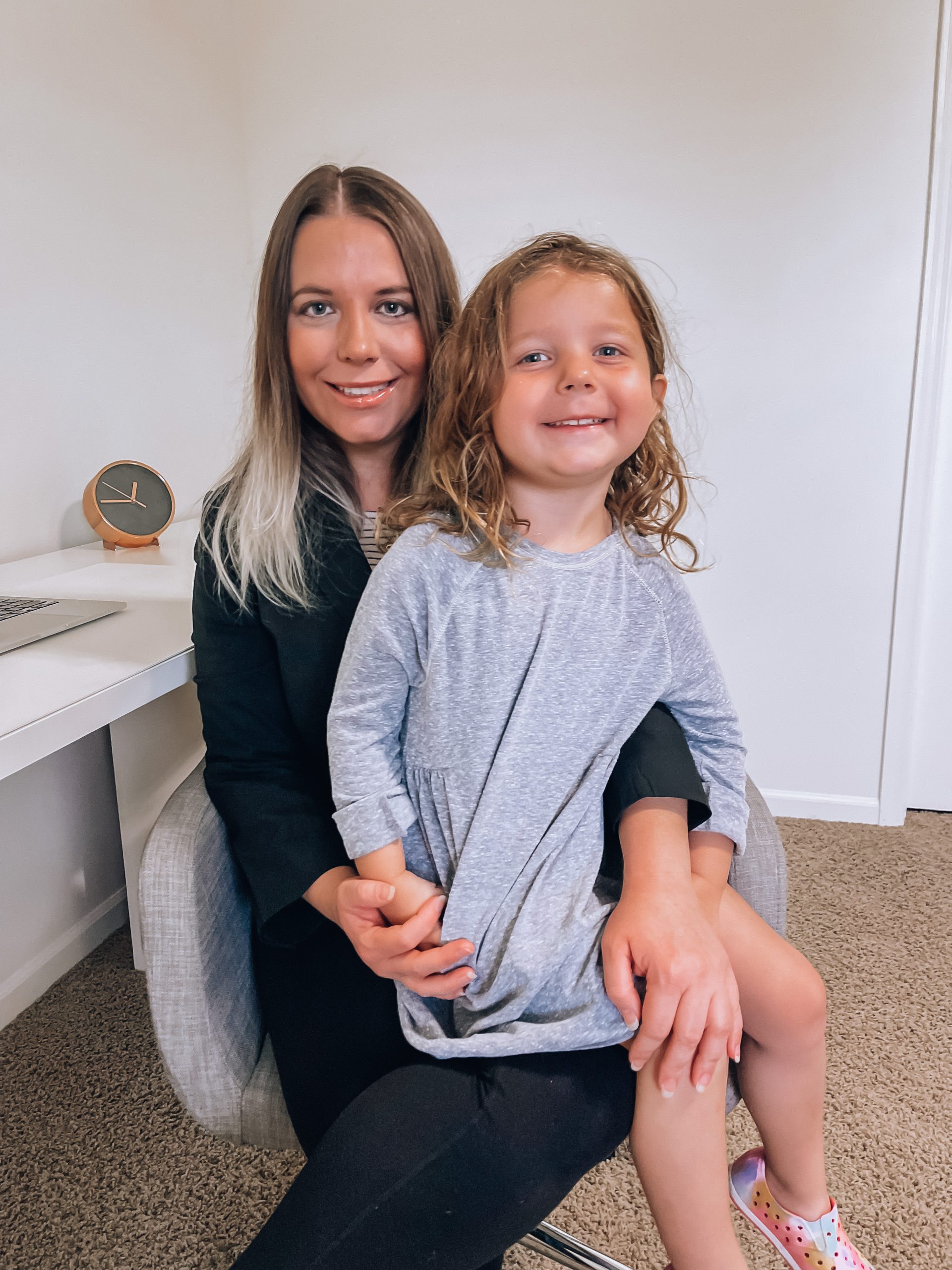
If you’re wondering how self-study for the bar exam turned out for me, I passed the UBE with a score of 311. All UBE jurisdictions set their own required minimum scores, ranging from 260-280. So, with a score of 311, I could apply for admission in any UBE state. (The picture above is of Blair and I on the day I was sworn into the Kansas bar! I was sworn in via Zoom so she was able to be with me.)
I hope this information on how to self-study for the bar exam was helpful to you! I’m happy to answer any questions, too. Feel free to leave a comment below or reach out directly with any questions. I passed the bar without a prep course and I hope this post inspired you to try the same!
Bar Exam Study Aids
For your convenience, I’ve included links to some recommended bar exam study aids (and a few gift ideas for after the bar!) below.
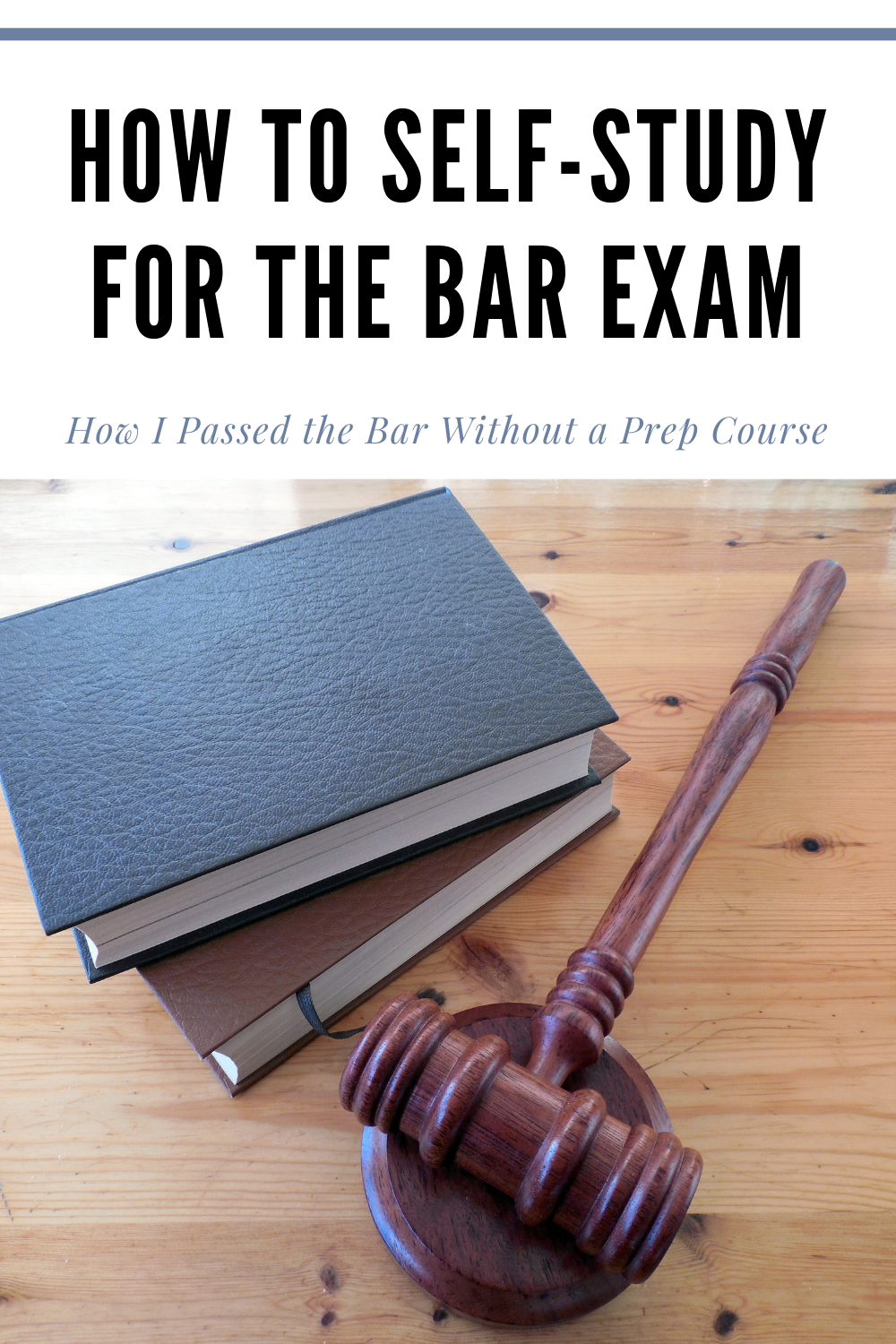
Pin this post on How to Self-Study for the Bar Exam for later!
Read these next:

